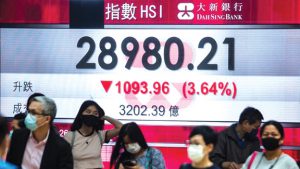Bloomberg
November looks set to mark a watershed moment for Chinese assets, as visible policy shifts away from Covid Zero triggered massive gains.
After being pressured under the weight of virus restrictions and a property crisis, markets surged amid hopes of an eventual reopening. Chinese stocks in Hong Kong are headed for their best month since 2003, while the yuan is on track for the biggest monthly gain in nearly four years.
Traders have added to bets since early this month when rumours spread over a Covid Zero exit plan, followed by a detailed 20-point playbook by authorities. Even as a surge in infections and protests against restrictions caused volatility in recent days, most investors believe that the path to reopening — however messy and disorderly — is
inevitable.
“The market will tend to price in a more hopeful reopening than an unchanged strict Covid Zero,†said Kiyong Seong, lead Asia macro strategist at Societe Generale SA in Hong Kong. “However, they may be frequently disappointed. Two steps forward and one step back kind of market reactions are likely.â€
The Hang Seng China Enterprises Index jumped 6.2% on Tuesday following a briefing where health officials urged elderly vaccination and reiterated that excessive restrictions should be avoided. That took the month’s gain so far to 26%.
In the briefing, officials struck a conciliatory tone towards residents unhappy with Covid-19 curbs. Local authorities must respond to and resolve “reasonable†Covid-19 requests from the public in a timely manner while reducing the inconvenience caused by outbreaks, said National Health Commission spokesman Mi Feng.
“It is becoming clear that the only path forward is moving toward reopening as the fatigue from prolonged restrictions is setting in,†said Marvin Chen, an analyst for Bloomberg Intelligence. “While the path to reopening will likely be bumpy, market sentiment can improve heading into 2023.â€
China’s reopening bets have also stirred optimism in other Asian markets that have close trade links, with the won and Australian dollar gaining.
The month also saw authorities take bolder steps to rescue the real estate sector, after its piecemeal approach earlier this year failed to reverse a slump. Property stocks and bonds advanced on Tuesday as the securities regulator lifted a multi-year ban on share sales. The removal of restrictions aims to support the “stable and healthy†development of the sector, according to a statement.
In another sign of easier funding access, a key program to guarantee local bond sales from developers will now accept collateral beyond just their core assets.
“The property measure is big for A-share developers, given the refinancing of developers in A-share has been technically suspended since 2010,†said Willer Chen, senior analyst at Forsyth Barr Asia Ltd. “This sends a strong signal to the market that CSRC wants to help developers†on their financing issues, he added, referring to the securities regulator.
A Bloomberg Intelligence gauge of developers jumped more than 7%, taking this month’s advance to about 62% — a record gain. The CSI 300 Index, a benchmark for mainland shares, ended up 3.1% in its best day in more than three weeks.
A Bloomberg index of China offshore dollar bonds of all ratings is set to log its first monthly gain since August 2021, while a separate gauge of the country’s junk dollar notes gained 17.4% through Tuesday, the most since October 2011.
The yuan appreciated, with offshore unit rising 1.2% against dollar. That puts the currency on track to strengthen more than 2% for the month and halt an eight-month losing streak.
“Investors will be happy if the protests accelerate a move to accepting Covid-19 and opening up the country,†said Andrew Collier, a managing director at Orient Capital Research Inc. “However, Xi Jinping’s history of centralized decision making is going to make it difficult for local officials to decide exactly how open they should be.â€
 The Gulf Time Newspaper One of the finest business newspapers in the UAE brought to you by our professional writers and editors.
The Gulf Time Newspaper One of the finest business newspapers in the UAE brought to you by our professional writers and editors.
